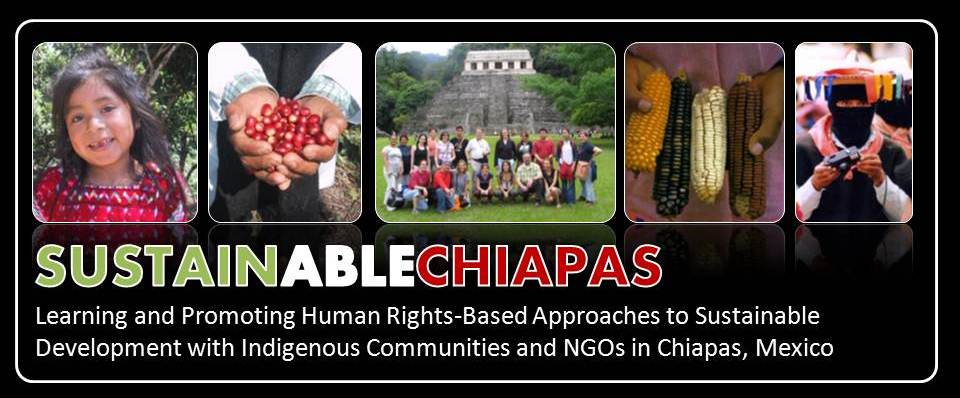 I came to Chiapas with a certain set of expectations, thinking that my experience would be similar to prior study abroad trips to Central America. I expected visits to fair trade coffee operations and meetings with local nonprofits, and consider them to be an important piece of the sustainable development puzzle. However, I was quickly surprised by the influence of the local Mayan culture in conversations surrounding development. I found its presence in the Catholic Church to be remarkable, unique, and indeed rare.
I came to Chiapas with a certain set of expectations, thinking that my experience would be similar to prior study abroad trips to Central America. I expected visits to fair trade coffee operations and meetings with local nonprofits, and consider them to be an important piece of the sustainable development puzzle. However, I was quickly surprised by the influence of the local Mayan culture in conversations surrounding development. I found its presence in the Catholic Church to be remarkable, unique, and indeed rare.I will admit that my perception of the Roman Catholic Church is skewed. It has always struck me as a religion out of touch with the world in which it operates. In Central America, for example, the progressive views of the poor and liberation theology were wholly unsupported and ignored by prior and current popes. I believe this to be a reflection of the Church’s inflexibility, an institution focused on exporting its religion and enforcing its culture.
However, this narrative is not reflective of Chiapas, a place that has experienced a renaissance in identity. The influence of Bishop Ruiz in this region ushered in dramatic changes. Healing churches such as those in San Juan Chamula, the prolific Mayan cross, and increased community participation are clear divergences from traditional Roman Catholic practices. Most noticeable are the physical changes inside the churches, such as floors lined in pine needles, the presence of multi-colored candles, and benches pushed to the sides of sanctuaries. These are all signs of the blending of Mayan and Catholic beliefs and practices. According to Tavanti’s book, Las Abejas, this is the unique combination of inculturation and liberation theology, or indigenous theology. It is the recognition of the importance of identity and the tremendous role it plays in the health of its people.
 Being witness to the indigenous cultures in Chiapas led me to reflect on my own father’s difficult and degrading experience with religion. Growing up on Turtle Mountain reservation he, like so many other native children of his generation, was forced to go to an Indian boarding school. Specifically, he attended St. Michael’s Indian Mission in North Dakota, a Catholic institution. At that time, it was a place intolerant of indigenous cultures, designed to fracture native communities.
Being witness to the indigenous cultures in Chiapas led me to reflect on my own father’s difficult and degrading experience with religion. Growing up on Turtle Mountain reservation he, like so many other native children of his generation, was forced to go to an Indian boarding school. Specifically, he attended St. Michael’s Indian Mission in North Dakota, a Catholic institution. At that time, it was a place intolerant of indigenous cultures, designed to fracture native communities.Up until the era of self-determination in the 1970s, The Bureau of Indian Affairs focused on assimilating all North American tribes. Boarding schools were efficient/effective tools in this process of separating children from their families and communities, requiring uniforms, and forbidding indigenous practices including native languages. My dad described this time in his life as one of the worst, a humiliating experience.
 What kind of impact would St. Michael’s have today, and in my dad’s life, if it had chosen a different path? Would I better understand my own culture and people if the school had embraced diversity instead of attempting to abolish an entire culture? Would area reservations be thriving, more prosperous and healthy?
What kind of impact would St. Michael’s have today, and in my dad’s life, if it had chosen a different path? Would I better understand my own culture and people if the school had embraced diversity instead of attempting to abolish an entire culture? Would area reservations be thriving, more prosperous and healthy?A common theme throughout the meetings and discussions in Chiapas was the role of indigenous cultures. So often, culture is framed as a hindrance or an obstacle to development. The assumption being that indigenous cultures have little to contribute to the field. Governments and organizations alike feel the pressure to adopt imported projects that have little relevance to those it seeks to help, such as the World Bank or IMF. If true sustainable development is to be achieved, value must be seen in all cultures. Thus, successful projects are those that are framed in terms of sustainable indigenous
 culture instead of economic growth or environmental progress.
culture instead of economic growth or environmental progress.The health of any people is their identity. It gives them direction, community, and a life’s mission. If development projects do not first recognize this is as a basic human right, there is very little chance of sustainability. This is the type of leadership Bishop Ruiz provided in his community and church, an idea that can extend beyond Chiapas. It is both a lesson and philosophy that I hope to embody in my own life and work.
Kim Christensen's Blog
Cited Works:
Tavanti, Marco. Las Abejas: Pacifist Resistance and Syncretic Identities in a Globalizing Chiapas. New York: Rutledge, 2003.
Additional References:
Berryman, Phillip. Stubborn Hope: Religion, Politics, and Revolution in Central America. New York: The New Press, 1994.
Bodley, John H. Victims of Progress. 5th ed. Walnut Creek, CA: Altamira Press, 2008.
Gedicks, Al. The New Resource Wars: Native and Environmental Struggles Against Multinational Corporations. Boston: South End Press, 1993.
http://www.youtube.com/watch?v=A5pJf2rlE8w
http://www.youtube.com/watch?v=bE3tFgQwYEI
